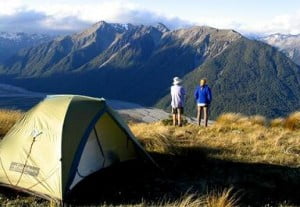Liz Childers

“Every year, millions of Americans flock to national parks and wilderness areas to enjoy the great outdoors. Unfortunately, many campers still don’t understand the best methods to minimize their ecological impact while camping.
I recently came across an impassioned letter to the editor about how to leave no trace while on a camping trip. The piece was written by a sixth-grader in El Dorado, California and has some great tips. Here a few ways to minimize your footprint while in the great outdoors.
Plan Where You’re Going
Many campers head into the woods without a clear plan of where they’re going. Aimlessness doesn’t damage the environment, but straying from designated trails can cause erosion along with damage to flora and fauna. Before you set off on a journey in the woods, plan your route on a trail map.
Pick a Good Campsite
If you’re heading off the trail, it’s important not to pitch your tent in a sensitive area. Stay at least 200 feet away from water sources like lakes and rivers, as soil there can be moist and sensitive and take longer to repair. Also, try not trample any plants or shrubbery that may provide food for animals.
Pick Up After Your Self
This seems like common sense, yet there are still numerous campers who litter every year. Remember that a can, bottle or plastic wrapper that you toss into the wild may sit there for centuries. Consider minimizing your trash by condensing your camping supplies into one Ziplock bag to avoid having wrappers that could blow away in the wind. Also, if you come across someone else’s litter while camping, do your fellow campers and the environment a favor and pick it up.
Don’t Have a Campfire
While a campfire may be one of the most traditional images we associate with a camping trip, it can also have negative effects on the environment. Stripping trees of their wood can deprive the forest of many of its nutrients. One popular option, which is much more environmentally-friendly, is to bring along a portable camping stove. This way you can cook food without doing environmental damage.
If you do have a campfire, try to use only dead wood. Also, keep an eye on your fire at all times and always drench the coals in hot water before putting it out. There is nothing worse than a forest fire.
When Nature Calls, Respect Nature
Just because the woods are expansive doesn’t mean you can do your business wherever you want. If you’re spending more than a night or two in one spot, you may want to consider building a latrine. If you defecate in the woods, dig a hole beforehand and cover up your feces after you’re finished.
The Bottom Line
You’re going camping because you enjoy the outdoors, so you should always do your best to preserve it. If you follow these tips, you can ensure that future campers will be able to experience the joy of camping for years to come.”



